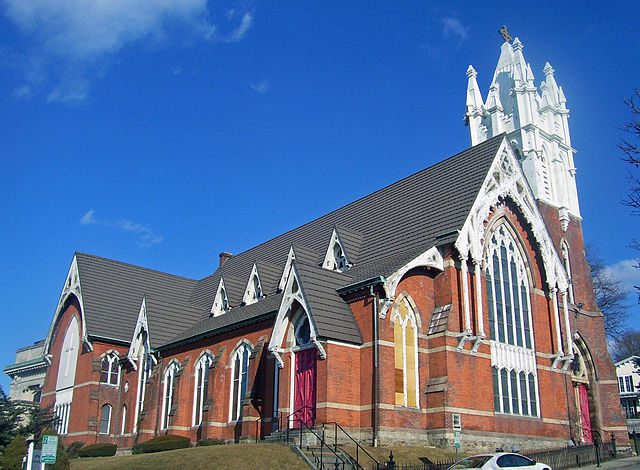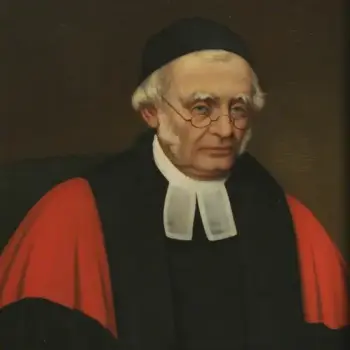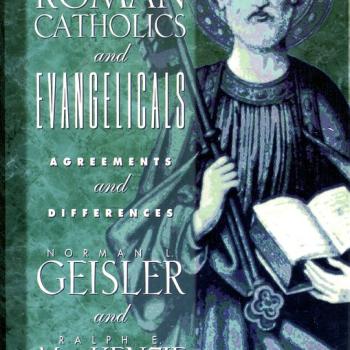
First Baptist Church of Ossining, New York (1874). Photograph by Daniel Case (2-9-09) [Wikimedia Commons / Creative Commons Attribution-Share Alike 3.0 Unported license]
***
(9-26-07)
***
[Note (1-3-17): this is a post from 2007. Sadly, Michael Spencer passed away in 2010 from cancer. He was an ordained pastor in the Southern Baptist denomination. I was privileged to engage in some constructive, amiable discussions with him. Very nice and spiritual man . . . ]
*****
Protestant pastor (and self-described “post-evangelical”) Michael Spencer, aka “The Internet Monk” has a lively blog that I link to on my sidebar, and also is active on the Boar’s Head Tavern forum (I also link to that). Here is my reply to his query (his words in blue).
Let me state up front that the very last intention of mine is to cause any offense to my Protestant brethren. Yet it often is the case that they are offended by Catholic opinions on these sorts of matters. I’m not sure that can be avoided, no matter how gently we reply, because it is the ideas themselves that are controversial to many. We can only try our best to be understanding, tolerant, and charitable, on both sides. May God help me to do so.
Michael Spencer has written some very kind words about me at Boar’s Head Tavern (comments of 9-27-07 and 9-29-07):
Dave Armstrong writes me really nice letters when I ask questions. As someone ridiculed by the arsonists [referring to anti-Catholic Phil Johnson’s Pyromaniacs blog], I have to have a liking for the guy. Really, his notes to me are always first class and very respectful and helpful.
We appear to have had a breakthrough in the “Catholic thing” here at the IM compound. At least I feel like a ton of weight has been lifted. I pray to the Lord that it’s replaced with peace and joy, and never returns. VII’s statement on Ecumenism has been really helpful, and Dave Armstrong has continued to answer my questions in respectful and helpful ways [we had some private correspondence also]. I thank the Lord for him.
[Update added later:
I really appreciate the kindness and all the time represented in the answers. I haven’t read the thread, but have read the MANY emails that I received. I’ll catch up on the thread later. (Internet has been down.) I especially thank those of you who know that I am not interested in converting to the Roman Catholic Church, but have friends I love who quite possible may some day, and I am asking in reference to my relationship to them. Again, thanks for your gracious answers and the very helpful, positive tone of the discussion. ]
*
It all depends on what one means by “valid.” Do we have a great deal of respect for Protestant pastors, ministers, clergymen? Absolutely. I certainly do. Some of the people I respect the most to this day are, for example, the pastor under whom I began my serious evangelical Christian walk with the Lord in 1977: (Lutheran) Pastor Dick Bieber in Detroit (now in Halifax, Nova Scotia) or Gus Flaherty (Assemblies of God) who married us in 1984. I have immense admiration for Protestant pastors, most of whom are very godly men, devoted to the gospel and the spiritual edification and growth of their flock. I have lots of pastor friends as well (Baptists, independents, Anglican; you name it). I think I’ve always shown a great deal of personal respect towards them. And I don’t think my outlook is all that different (if at all) from other seriously committed Catholics that I know.
Technical “validity” however, gets into different waters. Catholics believe that a truly valid, ordained clergyman is a priest, who presides over the Sacrifice of the Mass and the Eucharist, and has the prerogative to distribute the sacraments. Since most Protestant clergy would not profess to be a priest in the first place (this category was basically rejected in the 16th century, in favor of a “priesthood of all believers” that was essentially different in concept), it almost becomes a matter of apples and oranges. A Protestant pastor would be (in this light) more analogous to a Catholic deacon, who can preach and baptize and do other ministerial, pastoral functions, but not preside over the Mass.
The real clash (and possible offense) would generally be with folks like “high-church” Anglicans or “Anglo-Catholics” or Lutherans, who believe in some sense in the Real Presence of the Eucharist. The Catholic must say that we disagree that the Real Presence occurs in a Protestant church, since from our perspective the apostolic succession without which true ordination is possible was broken in the 16th century by the schism of Protestantism. We do, however, happily acknowledge the validity of trinitarian Protestant baptism, as a valid sacrament. And we regard the marriage of two validly baptized Protestants also as a valid sacrament (the sacrament of matrimony). Vatican II and subsequent ecumenical documents have stressed the many ways in which we believe that non-Catholic Christians receive grace and many good and spiritual things.
As for being called to be a minister, that is no problem (taking into consideration how evangelicals would define what a minister or pastor is in the first place). I never deny the validity, for example, of my own personal calling as an apologist / evangelist, that occurred in 1981 and was reiterated by God very strongly in 1985 when I commenced my work as a full-time campus missionary. I was indeed called to that work, as is seen in my subsequent career and writing. Nor do Catholics cast doubt upon what Protestants refer to as a conversion to Jesus Christ (or, as they classify it, becoming justified or saved). Again, I do not do so at all, with regard to my own conversion in 1977. Nor do I know of any Catholics who would do so. We would only question whether one was saved in that instant, according to how we interpret biblical soteriology.
*
Yes, it should be. You are entirely right. it’s an ironic case where a Protestant observer who knows Catholic teaching fairly well, actually understands it better than a “cafeteria Catholic” who wants to play games with the faith he supposedly espouses. I’ve written about various inanities and difficulties of liberalism and dissent in Catholic circles (see my web page on that). I’ve also explained that Catholics are not at liberty to pick and choose what they like of Catholic teaching, a thing that was strongly emphasized by people like St. Thomas Aquinas, Cardinal Newman, and my own mentor, the late Fr. John A. Hardon, S.J., who was one of the leading catechists in the US, and advisor to Pope Paul VI and Mother Teresa’s Missionaries of Charity. A Protestant would be entirely correct and within his bounds to rebuke a Catholic of this sort, as being at best inconsistent, or at worst, dishonest. For related reading, see my section on “private judgment” on my Bible & Tradition web page.
3) What would be the church’s view on someone who is convinced the Catholic faith is true, but who is unable or chooses not to openly convert to Catholicism at this time? Is such a person committing a sin?
There are many sensitive family matters that the Church respects. We urge potential converts to take their time and think through the issues very seriously and at length, accompanied by much prayer and reflection. If someone is in a long spiritual process where they are possibly considering becoming a Catholic, we would strongly urge this approach.
If, however, a person states that they are absolutely convinced of the truth of the Catholic faith, then there comes a point when we would say that they are obligated to be received into the Church, even if it causes difficulty, because they have to follow their conscience. It comes down to the individual situation, but it could indeed possibly be a sin if a person is convinced and goes years and years without acting upon that knowledge. God holds us responsible for what we know.
4) Exactly what is meant when a non-Catholic goes forward at communion to be blessed, but not partake? What if such a person- like myself- openly disagrees with some of the church’s teaching and is not seeking reception into the church?
If they approach the altar with an attitude of solemnity and reverence, even if not agreeing with all that we believe takes place there, we honor that and believe that such a person can receive a “spiritual communion” and/or a blessing from the priest, should the latter decide to do that (a sacramental, not a sacrament, which has a positive effect insofar as the person receiving it is properly disposed and receptive).
I think it would be much the same as when I attend a Protestant service. I recognize that I disagree with the conception they have of Holy Communion, but I respect my surroundings and appreciate the piety and worship being expressed by my Protestant brothers and sisters.
Catholics do believe that agreement in doctrine is required in order to partake of Holy Communion, which is why we have closed communion (like some Protestant denominations; e.g., Missouri Synod Lutherans do). I’ve written about this general subject.
5) What is the church’s view of leadership and submission in marriage? Would the church teach that a wife should join the church over the objections of her Christian, but Protestant, spouse? If so, how does this fit into the church’s teaching on marriage?
As for the second question, I would refer back to my reply for #3. Every person must follow their (properly formed) conscience. After all, it is their soul that is at stake, and sometimes a Christian (of any type) has to be unpopular with friends or family for taking a stand that they feel they must take in following God rather than men. I’ve written elsewhere about headship and submission issues.
I hope my replies have been helpful, edifying, respectful, and not offensive to any non-Catholics reading.













